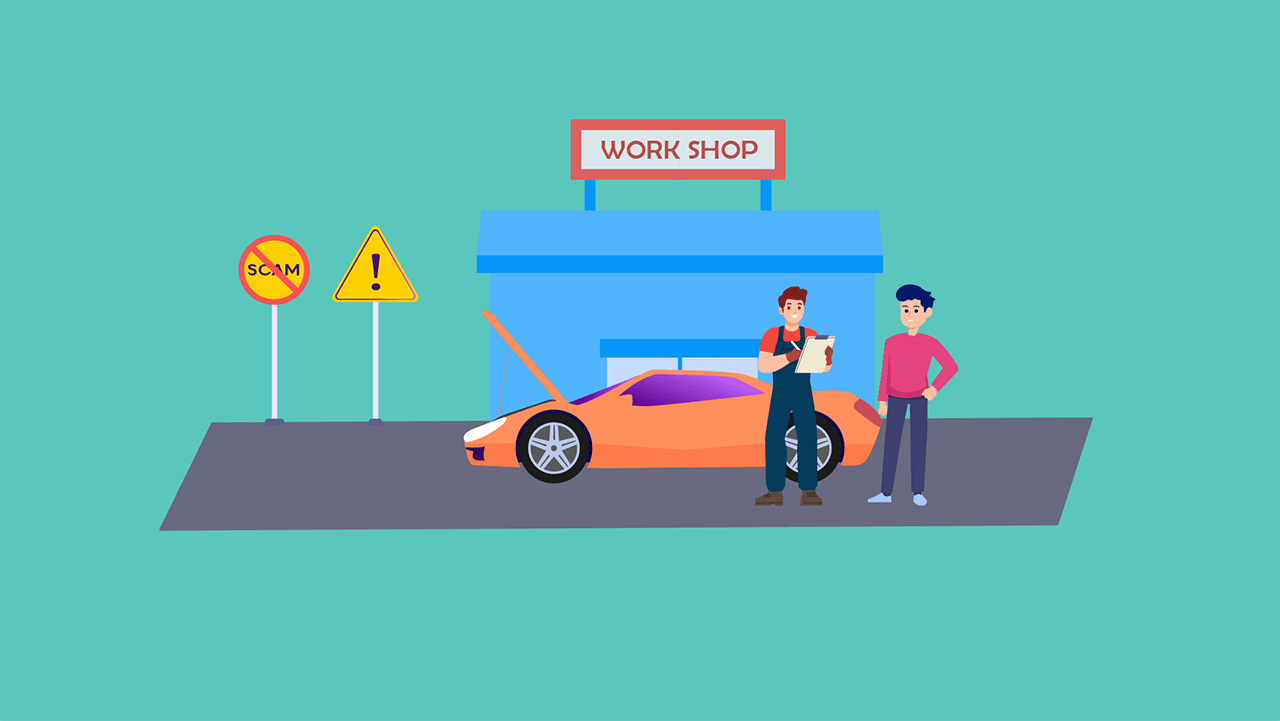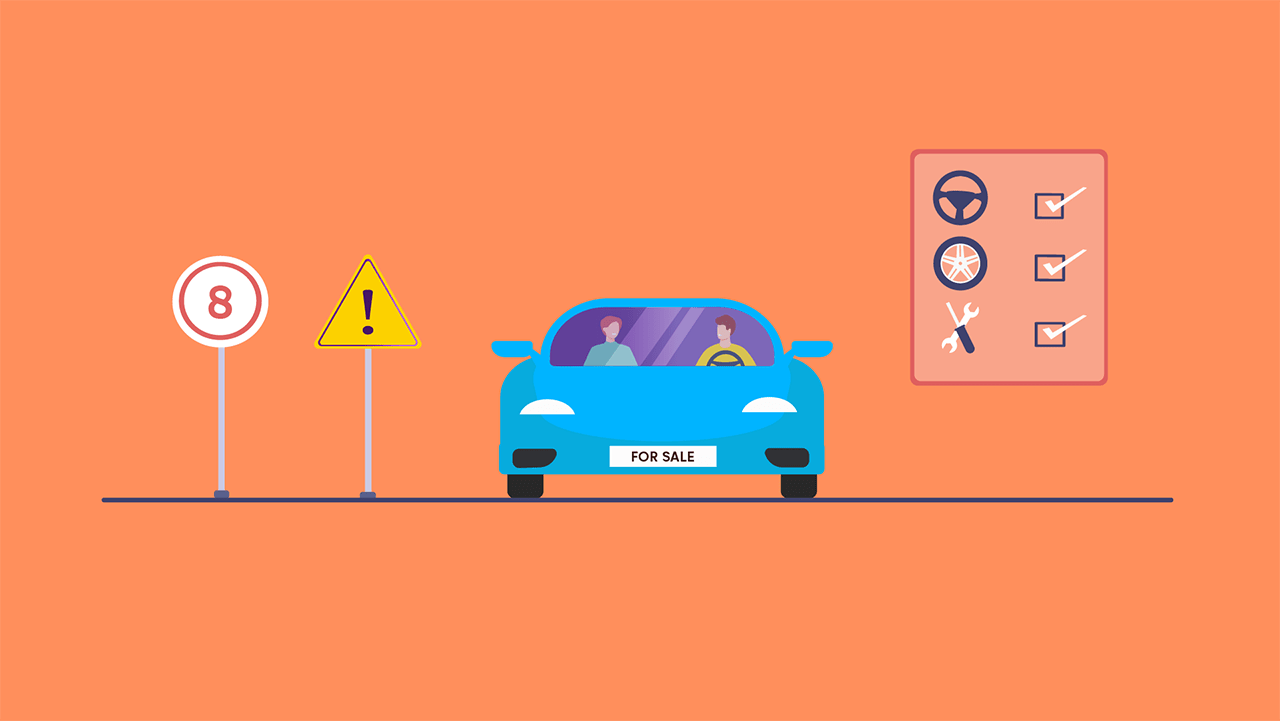Buying a Used Car? Ask These 19 Key Questions.
By Umm e Hani on Apr 24, 2024Contents
- 19 Key Questions To Ask When Buying A Used Car
- What's the Vehicle's Mileage?
- Can I See the Maintenance Records?
- Has the Car Been in any Accidents?
- Are There Any Mechanical Issues?
- Why is the Owner Selling?
- What's the Vehicle's Ownership History?
- Can I Take It for a Test Drive?
- How's the Tire Tread?
- Is the Title Clear?
- What's the Fuel Efficiency?
- Are All the Features Functional?
- Has it Passed Emissions Testing?
- Are There Any Recalls?
- Can I Have an Independent Inspection?
- What's the Warranty Coverage?
- How's the Vehicle's Resale Value?
- What's the Vehicle Identification Number (VIN)?
- How Negotiable is the Price?
- What's the Mode of Payment?
- That’s A Wrap!
- FAQ
Buying a used car can be an exciting yet overwhelming experience. It’s important to ask the right questions. This will ensure you make an informed decision and drive away with a reliable vehicle. In this blog, we'll break down the 19 key questions to ask when buying a used car.
19 Key Questions To Ask When Buying A Used Car
1. What's the Vehicle's Mileage?
Mileage is like the car's biography. It reflects how much life the vehicle has experienced on the road. While a lower mileage can be appealing, it's not the sole indicator of a good deal. High mileage doesn't necessarily mean trouble if the car has been well-maintained. Ask for the exact mileage and use it as a starting point to understand the car's overall wear and tear.
2. Can I See the Maintenance Records?
The maintenance records are the car's medical history. Requesting these documents is a vital step. Because it will ensure you're not inheriting a vehicle with a hidden illness. Look for a comprehensive record of regular services, oil changes, and any repairs conducted. A well-documented maintenance history is a sign of a responsible owner and a healthy car.
3. Has the Car Been in any Accidents?
Accident history is the ghost in the machine. Ask for a detailed accident report to uncover any past collisions. A transparent seller should willingly share this information. And it provides insights into the car's structural integrity. Even minor accidents can have lasting effects, so it's crucial to know the vehicle's accident history.
4. Are There Any Mechanical Issues?
Peek under the hood and into the car's heart. Inquire about any existing or past mechanical issues. This question prompts the seller to disclose any ongoing problems or repairs needed. It's better to be aware of potential fixes upfront than to discover them post-purchase. Understanding the mechanical condition is key to predicting future maintenance costs.
5. Why is the Owner Selling?
Understanding the seller's motivation can reveal a lot about the car's condition. A straightforward answer builds trust and helps you gauge if there are any urgent issues prompting the sale. Whether they are upgrading or downsizing, this question offers valuable context that may impact your decision. If the seller hesitates or provides vague answers, it could be a red flag warranting further investigation.
6. What's the Vehicle's Ownership History?
Knowing how many hands the car has passed through is akin to understanding its social circle. Multiple owners within a short period may raise concerns. A stable ownership history usually implies a well-maintained vehicle. Clarify the number of previous owners and the duration each held the car to ensure there are no irregularities or red flags.
7. Can I Take It for a Test Drive?
The road test is your personal assessment of the car's behavior. Take your time during the test drive to evaluate how the vehicle handles different road conditions. Pay attention to any unusual noises, vibrations, or handling issues. This experience not only gives you a feel for the car. But also provides an opportunity to spot potential concerns that may not be evident when stationary.
8. How's the Tire Tread?
Tires are the shoes of your car, and their condition speaks volumes about its health. Inspect the tire tread for even wear, which can indicate proper alignment and regular rotation. Uneven wear patterns might suggest suspension or alignment issues. Check for adequate tread depth, as worn-out tires can compromise safety. And add an additional expense soon after purchase.
9. Is the Title Clear?
The car's title is its legal document, and a clear title is essential for a smooth transfer of ownership. Request to see the title and verify that it is free from any liens, salvages, or legal complications. A clean title ensures that you are not inheriting any unforeseen legal or financial issues associated with the vehicle.
10. What's the Fuel Efficiency?
Understanding the car's fuel efficiency helps you estimate your ongoing expenses. Different cars have varying fuel economies, and it's crucial to align this with your driving needs. Whether you prioritize city driving or highway mileage, knowing the fuel efficiency provides insights into your future fuel costs. This information also contributes to your overall budget planning for the vehicle.
11. Are All the Features Functional?
A thorough check of the car's features ensures you're getting what you pay for. From air conditioning and power windows to entertainment systems, test each feature for functionality. Malfunctions may indicate underlying electrical issues that could become costly to repair. Confirming that all features work as intended enhances your overall satisfaction with the purchase.
12. Has it Passed Emissions Testing?
Emissions compliance is not just a legal requirement but also an environmental consideration. Confirm that the vehicle has passed recent emissions tests, ensuring it meets state regulations. This step is crucial for both legal compliance and reducing your carbon footprint. A car that meets emission standards is not only environmentally friendly but also more likely to pass future inspections.
13. Are There Any Recalls?
Staying informed about recalls is a proactive approach to safety. Ask the seller if the vehicle has been subject to any recalls, and run a simple VIN check on the National Highway Traffic Safety Administration (NHTSA) website. This check will reveal if the car has any outstanding recalls. Or if they have been appropriately addressed. Addressing recalls promptly ensures that the vehicle meets safety standards.
14. Can I Have an Independent Inspection?
Bringing in a trusted mechanic for an independent inspection adds an extra layer of assurance. An unbiased evaluation from an expert can uncover potential issues that may not be apparent to the average buyer. While the seller may offer information. But an independent inspection offers a comprehensive and unbiased assessment. It will provide you with a clearer picture of the car's condition!
15. What's the Warranty Coverage?
Understanding the warranty coverage is crucial for future peace of mind. Inquire about any existing warranty on the vehicle. If the car is still under warranty, get detailed information about the coverage, duration, and any conditions. If the warranty has expired, consider exploring options for purchasing an extended warranty. Knowing the warranty terms helps you anticipate and manage potential repair costs.
16. How's the Vehicle's Resale Value?
Even if you're not thinking about selling in the near future, knowing the car's resale value is strategic. Cars with good resale value typically retain their worth over time, offering a better return on investment. Research the model's resale value and consider it as a factor in your decision-making process. A car that holds its value well can be a wise long-term investment.
17. What's the Vehicle Identification Number (VIN)?
The Vehicle Identification Number (VIN) is your tool for uncovering the car's hidden history. Request the VIN and run a background check using online resources or services. The VIN provides information about the vehicle's origin, recalls, accidents, and title history. Verifying the VIN ensures that the details provided by the seller align with the vehicle's actual history.
18. How Negotiable is the Price?
Negotiation is a standard part of the used car buying process. Research the market value of the specific make and model to understand a fair price range. Consider the condition of the car, its mileage, and any additional features when negotiating. Be prepared to walk away if the seller isn't willing to meet a reasonable price, and remember that negotiating is a two-way street.
19. What's the Mode of Payment?
Clarify the payment process to avoid misunderstandings. Discuss the acceptable modes of payment, whether it's cash, check, or financing. If you're financing the purchase, inquire about the terms and interest rates. Ensure that all payment-related documentation is clear and in accordance with legal requirements. A transparent and agreed-upon payment process contributes to a smooth and stress-free transaction.
That’s A Wrap!
With these 19 key car questions, you're all set to ace the used car buying game. Remember, knowledge is your best friend in making a smart choice when buying an old car. Ask the right questions, feel confident, and drive off with a dependable ride. Happy car hunting!
FAQ
What To Look For When Buying A Used Car?
Check the vehicle's maintenance records for a well-documented history. Inspect the body and mechanics during a test drive. Verify the title to ensure a clean legal status.
What To Check For When Buying A Used Car?
Examine tire tread and overall condition. Confirm the car's accident history through a detailed report. Take note of any unusual noises or warning lights during the test drive.
What Things To Know Before Buying A Car?
Research the model's resale value for a wise investment. Understand the terms of the warranty, if any. Be prepared to negotiate the price based on market value and the car's condition.
What Do You Need To Buy A Car?
Ensure you have a valid driver's license and proof of insurance. Secure financing or be ready with the preferred mode of payment. Consider getting a pre-approved loan for a smoother buying process.


